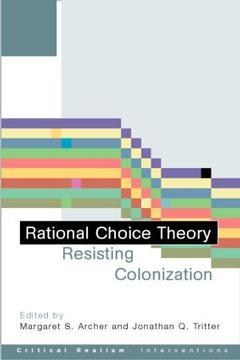Description
Rational Choice Theory
Resisting Colonisation
Ontological Explorations (Routledge Critical Realism) Series
Coordinators: Archer Margaret S., Tritter Jonathan Q.
Language: English
Keywords
instrumental; rationality; homo; economicus; methodological; individualism; models; extended; utility; function; Young Man; UK High Educational Institution; Extended Utility Function; Cultural Emergent Properties; Rational Choice Theory; Zey 1992b; Rational Pursuit; Wertrational Action; Somatic Marker; Violated; Word Of Mouth; USA; Census; Follow; Homo Sociologicus; Underclass Individuals; Parental Ballot; Rational Choice Models; Instrumentally Rational; UK High; RM Perspective; RCT Methodology; Forceful Destruction; Overburdening; Vice Versa
Publication date: 12-2000
· 15.6x23.4 cm · Paperback
Publication date: 12-2000
· 15.6x23.4 cm · Hardback
Description
/li>Contents
/li>Readership
/li>Comment
/li>
Rational Choice Theory is flourishing in sociology and is increasingly influential in other disciplines. Contributors to this volume are convinced that it provides an inadequate conceptualization of all aspects of decision making: of the individuals who make the decisions, of the process by which decisions get made and of the context within which decisions get made.
The ciritique focuses on the four assumptions which are the bedrock of rational choice:
rationality: the theory's definition of rationality is incomplete, and cannot satisfactorily incorporate norms and emotions
individualism: rational choice is based upon atomistic, individual decision makers and cannot account for decisions made by ;couples', 'groups' or other forms of collective action
process: the assumption of fixed, well-ordered preferences and 'perfect information' makes the theory inadequate for situations of change and uncertainty
aggregation: as methodological individualists, rational choice theorists can only view structure and culture as aggregates and cannot incorporate structural or cultural influences as emergent properties which have an effect upon decision making.
The critique is grounded in discussion of a wide range of social issues, including race, marriage, health and education.




